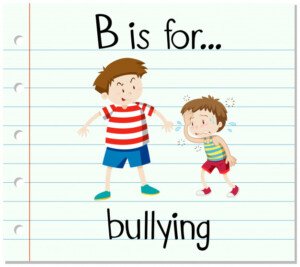
The only difference between school bullying and sibling rivalry may be their names.
Parents sometimes toss out that term, “rivalry,” to soften their perception of a truly bullying situation.
“Sibling rivalry and bullying at school can have the same impact on both the victim and perpetrator,” says Stacy Kaiser, a southern California-based licensed psychotherapist and relationship expert with a special interest in the topic of bullying.
“In both cases, the victim feels helpless, powerless, intimidated and out-of-control. He or she can be left with low self-esteem, depression, anxiety, a drive towards drugs or alcohol, and even suicidal thoughts.”
When this dynamic occurs, it’s not rivalry. Yes, sibling rivalry exists, but bullying is a different kind of behavior. Denying it by slapping on the label “rivalry” won’t make the problem go away.
“The perpetrator feels powerful, superior and a feeling of inappropriate pleasure,” continues Kaiser.
“He or she can be inspired to continue to bully both the sibling and the people at school, and that desire can escalate to bullying or physical violence in other environments.
“It allows the perpetrator to feel entitled, to have inappropriate boundaries and to develop a sense of grandiosity.”
Whether you wish to label the hostile behavior between siblings as rivalry or not, one thing is for sure:
Hostility between siblings brings a unique component that’s absent in the classroom between classmates:
The victim can’t get rid of the sibling. The victim lives with the bully. Even in the middle of the night, the bully might strike. School may even be something of a sanctuary, even if the victim is bullied there too.
“Sibling rivalry can actually be worse than bullying at school, because the siblings often spend more time together, and because of family obligations or loyalty, the victim is often less likely to tell the parents about the excessiveness or significance of the bad behavior,” explains Kaiser.
Furthermore (and very unfortunately), it’s not unheard of for the bully in the home situation to actually be favored over the victim.
In such a case, the parents tend to believe the bully’s version of events, even going as far as accusing the victim of “starting it” or “bringing it on,” or not being mature enough to stop complaining about it.
On the other hand, “bullying at school can be more intense, because the bully is attempting to get attention from an audience of their peers, whereas on the home front, the sibling is often doing it for their own gratification or revenge and not for attention.”
With over 100 TV appearances on major networks including CNN, NBC, CBS and ABC, Stacy Kaiser brings a unique mix of provocative insight to many topics such as anger management, office relationship issues and parenting.
 Lorra Garrick has been covering medical, fitness and cybersecurity topics for many years, having written thousands of articles for print magazines and websites, including as a ghostwriter. She’s also a former ACE-certified personal trainer.
Lorra Garrick has been covering medical, fitness and cybersecurity topics for many years, having written thousands of articles for print magazines and websites, including as a ghostwriter. She’s also a former ACE-certified personal trainer.
.










































